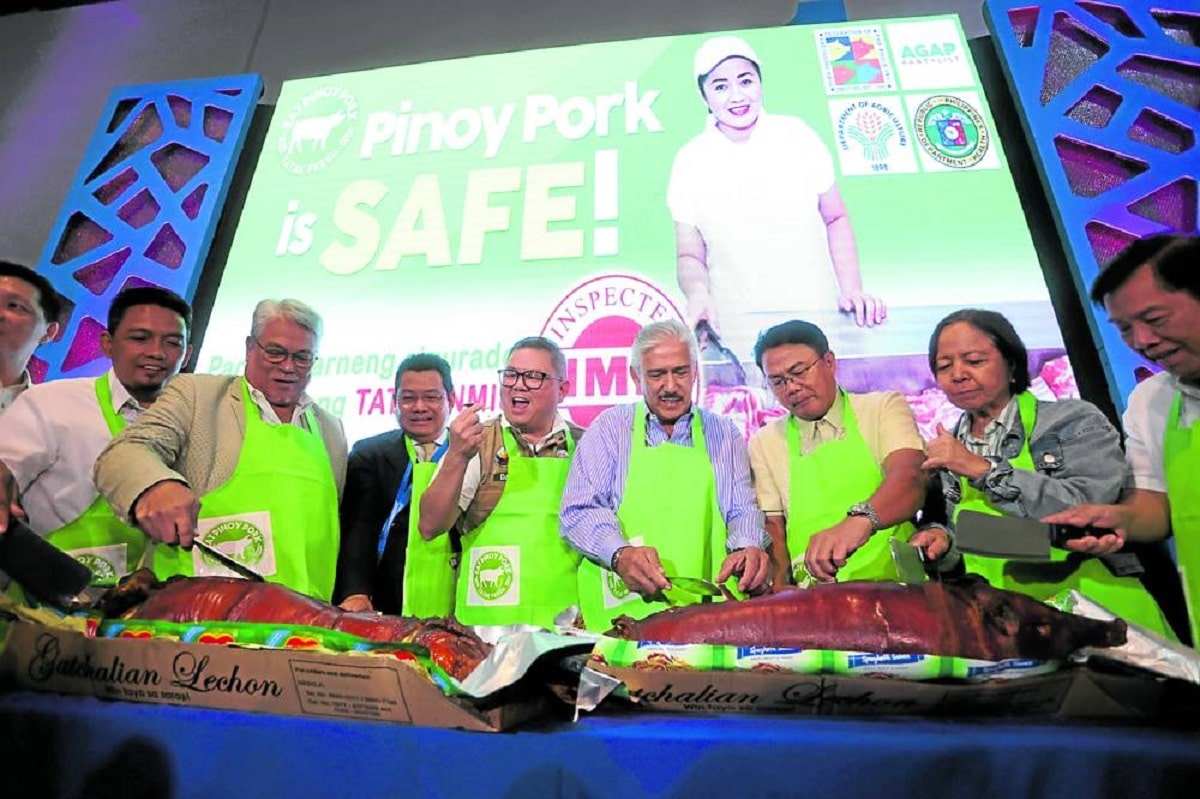
TASTE TEST Agriculture Secretary Francisco Tiu Laurel Jr., former Senate President Vicente Sotto III, Agap Rep. Nicanor Briones (4th to 6th from left) grace the launch of “Pinoy Pork is Safe” campaign by the Pork Producers Federation of the Philippines on Wednesday. They led the tasting of “lechon” during an agriculture convention to ease consumers’ worries that local pork is unsafe for consumption amid cases of African swine fever. —Niño Jesus Orbeta
MANILA, Philippines —The Department of Agriculture (DA) is bent on starting the inoculation of hogs in Lobo, Batangas, against African swine fever (ASF) on Friday, with its top official saying that more doses are expected to arrive in the Philippines this weekend.
“We will try our best [to start the vaccination] this Friday. In case of a delay, the schedule might be pushed back by one or two days but the target is to begin it this Friday,” Agriculture Secretary Francisco Tiu Laurel Jr. said on the sidelines of the Philippine Poultry Show and Idex Philippines 2024 held in Pasay City.
READ: Zero ASF in QC, joint checkpoints with BAI continue – Belmonte
Some 10,000 doses of ASF live vaccines, manufactured by AVAC Vietnam, will be administered to hogs in Lobo, the “ground zero” of swine fever resurgence in the country, which will be provided by the government for free and voluntarily.
Tiu Laurel told reporters another 150,000 vaccine doses, also from Vietnam, are expected to be delivered by this weekend.
According to the World Organization for Animal Health, ASF is a severe viral disease affecting domestic and wild pigs. This highly contagious hemorrhagic viral disease is usually deadly but is not a risk to human health, although it can destroy livestock production and lead to economic losses.
Symptoms include fever, loss of appetite, lack of energy, abortions, internal bleeding, with hemorrhages visible on the infected animal’s ears and flanks.
Tiu Laurel said the graft charges filed recently in the Office of the Ombudsman over alleged anomalies in the procurement of ASF vaccines could cause delays in implementing the government-controlled vaccine rollout in Batangas.
Charges were filed against Tiu Laurel and past and current officials of the DA, the Bureau of Animal Industry, the Food and Drug Administration (FDA), and executives of local vaccine distributor KPP Powers Commodities, claiming “they connived to illegally import, conduct tests and seek product registration of the ASF vaccine.”
Based on the complaint, some of them “usurped or took upon themselves” the FDA’s power and authority, and “avoided to seek clearance” from the National Committee on Biosafety of the Philippines to import, test, and conduct research on the AVAC ASF live vaccine.
Tiu Laurel said he would need to replace several people named in the Ombudsman complaint and appoint those who “are willing to do the job.”
“All this is delayed because of him or whoever filed the complaint … more and more pigs will die or be affected (because of ASF),” he added.
Inspection
DA personnel have inspected a total of 1,963 shipments of live animals and meat products across Metro Manila as of Wednesday to control the spread of this animal disease.
Of these, 113 shipments were returned to their points of origin due to noncompliance with animal health regulations, while 13 were subjected to further testing to ensure they were free from diseases.
Some 10 shipments were condemned due to “serious health concerns,” while 1,827 shipments were cleared and released after meeting the requirements.
As a result of the ASF outbreak, Samahang Industriya ng Agrikultura executive director Jayson Cainglet said the farmgate price of live pigs dropped by P30 to P40 a kilo, resulting in lower prices of related products, as many consumers are afraid of eating pork.
But in the Pasay event, Tiu Laurel expressed his support for the local hog industry, saying that locally produced pork is safe for human consumption.

